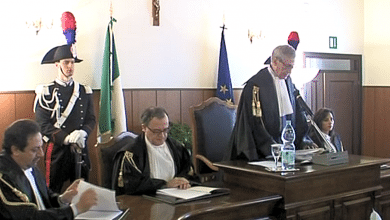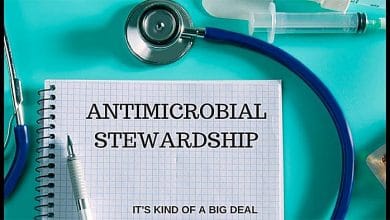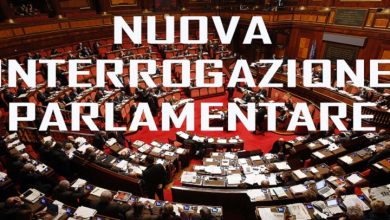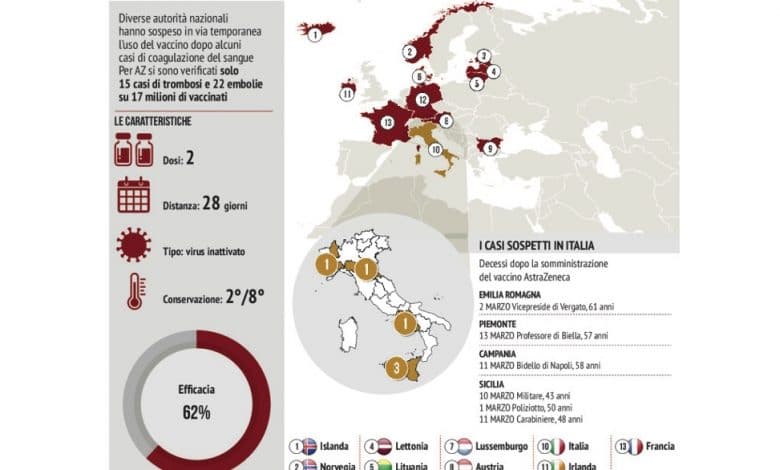
AstraZeneca, Rasi speaks: «I led Ema and Aifa and I tell you: the political stop is a mistake. »
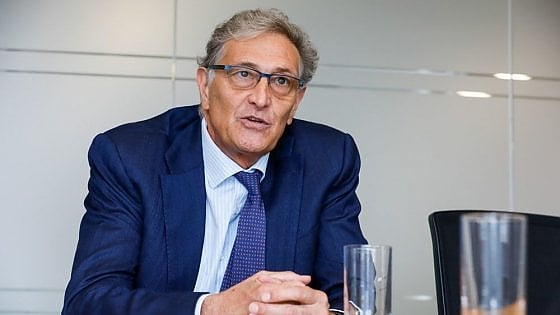 For nine years at the direction of Ema and three years at the helm of Aifa, Guido Rasi observes the complex situation of AstraZeneca from the outside. There are hours of waiting before a verdict from the regulator that can clarify the use of the Oxford vaccine, now put on standby by many European countries. The first reassurances from the European Medicines Agency – which has excluded for the moment a direct relationship between the drug and the cases of thrombosis that have occurred in Europe – do not change the climate of uncertainty that dominates the public debate.
For nine years at the direction of Ema and three years at the helm of Aifa, Guido Rasi observes the complex situation of AstraZeneca from the outside. There are hours of waiting before a verdict from the regulator that can clarify the use of the Oxford vaccine, now put on standby by many European countries. The first reassurances from the European Medicines Agency – which has excluded for the moment a direct relationship between the drug and the cases of thrombosis that have occurred in Europe – do not change the climate of uncertainty that dominates the public debate.
Professor Rasi, in less than 24 hours the experts went from zero risk indications to a ban on the use of the drug throughout the country. Where does the scientific decision end and the political one begin?
«In terms of public health, each State can decide autonomously on the risks of safety. This is the only criterion that, in the absence of a clear verdict from science, can condition individual regulatory agencies. Yesterday Aifa found itself in this precise situation and had to submit to the decision of the Ministry of Health. The domino effect started in Germany, where one of the regulatory agencies noted that there was a concurrence of similar cases of thrombosis after the vaccine. France claimed to have seen similar cases in retrospect, followed by Spain soon after. In Italy the cases found seem to be different from those highlighted in Germany or France: instead of investigating further, the stop was decided, with all the psychological consequences of the case. Among other things, since the EMA has the possibility of making a comparison between batches in a centralized way, I wonder: why didn't they allow the European body to make the necessary reasoning before throwing the vaccination campaign to skepticisms?»
"Precautionary measure," they say
“If it had been a prevention campaign for a disease that may come, I would understand. But here we are in the midst of a pandemic and we are certain that if we do not vaccinate 400,000 people a day, many will die from Covid. Today the principle of proportionality applies: putting a certain number of people at risk to protect an uncertain number of people - assuming and not granting that the cause is precisely the vaccine - is not correct. This is the responsibility that the health authorities of the individual states are called to take".
But can this link really be ruled out?
«Scientists do not give certainties a priori, but the numbers speak for themselves. In Germany they have administered about 1 million and 700 thousand vaccines with AstraZeneca, and there have been 5 or 6 cases of thrombosis: it means that it happens once every 300 thousand. Transferring the reasoning to Italy, it means that a city like Bari or Padua, or two cities the size of Pisa, would not have even one case. Certainly, however, without vaccinations they would record a clearly definable number of deaths from Covid. Which scientific evidence should we prefer?”
The numbers suggest low risk, but the cause of those few cases will still have to be clarified
"Certain. In the disadvantage of being late with the plan we have the advantage that others are ahead. We take the United Kingdom: 24 million vaccinated, of which 63% with Astrazeneca. They reported an equal number of thromboses to those registered with Pfizer, and an identical number to unvaccinated people. If there are these numbers in the United Kingdom, and in other countries higher numbers – albeit not risky – the differences will need to be verified».
For example?
«Predisposing factors of one population compared to another, concomitance with other drugs, damaged batches».
We should only know all this from Ema on Thursday. How is the agency operating in these hours?
«First of all, try to have all the possible information on the lots to check if there has been a quality problem, or if they are different lots and produced in different plants. The information will be obtained by comparing them to the English ones: we have an important reference term that should be used rightly. Secondly, the institution will try to have as much clinical data as possible on the table from the states that have reported cases. Let's take into account that continuous reports are received by Ema and that 27 states are sitting at the table. An investigation will have to be prepared, the elements put in order and a meeting convened on the basis, in fact, of still little data. If we put the countries reported so far together, there will be a total of 30 or 40 cases to be analyzed out of 4 or 5 million people. And if these are not strictly homogeneous, as is probable, it will be a great challenge from a statistical point of view. Usually these analyzes take months.
What are the clinical hypotheses to be tested?
«The first hypothesis to work on is that of randomness. That is, the possibility that the adverse events recorded are a coincidence. To understand better: in Italy there are about 1,500 deaths a day. If I vaccinated 60 million Italians and 24 hours later I had 1500 deaths, there would certainly be a connection of time but not of cause. The second possibility is to evaluate whether there are similar elements and congruences triggered on the cases examined. On the same front, given the rarity of the episodes, Ema will have to establish whether the victims have similar characteristics that have made them sensitive to the effects of the vaccine.
And what could be the factors of increased sensitivity to the vaccine?
«Of a genetic nature, for example. Of a pharmacological nature (they took similar drugs), or of diseases that may predispose to states of thrombophilia"
With how many types of verdicts will Ema be able to express herself?
"L'Ema will basically be able to say three things: that the "benefit-risk" ratio is favourable, and therefore to declare the AstraZeneca vaccine safe again for all. That the positive "benefit-risk" ratio is limited to people who do not have certain pathologies. Finally, that the ratio between risk and benefit is negative.
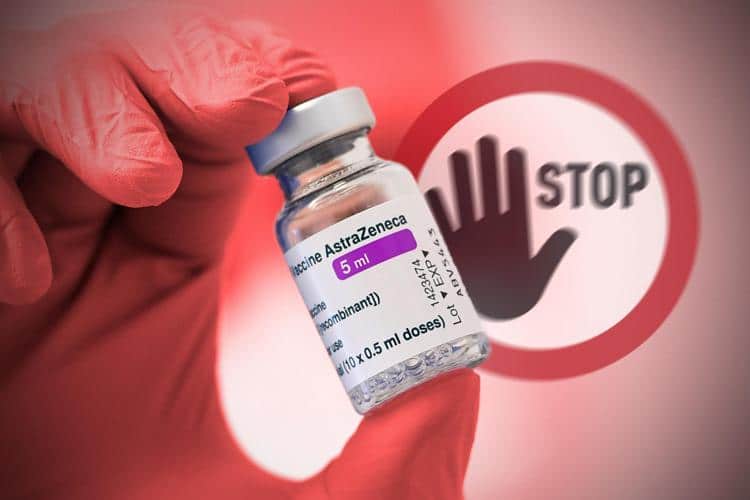 In the latter case what should happen?
In the latter case what should happen?
«Within 48 hours there would no longer be a vial of AstraZeneca in all of Europe. Through its network of inspectors, Ema would immediately withdraw all drug lots. A decision which the states obviously could not oppose. Same thing for the speech of the limitation of administrations to certain categories of the population and not others ».
How likely is this to happen in your opinion?
«In terms of "risk-benefit" evaluation, I don't think there will be a change from what we already know. I repeat: the deaths from Covid that will occur if people are not vaccinated are certain; the number of adverse events is uncertain and currently negligible. ».
Could the verdict not be final?
“It depends on the data. What will be given is the best interpretation with the greatest possible evidence.
9 years in Ema, 3 in Aifa. Have you ever had to make decisions of this type and with this timing?
"I remember the case of nitrosamine for hypertension. We have collected entire lots of important drugs from non-European countries and we did it in 48 hours, blocking their arrival in Europe. But we had clear data. In other cases it was necessary to wait 5 or 6 months before deciding. What has always guided us is the criterion of proportionality. If I remove an anticoagulant drug the absence of which can cause more deaths than the administration, I cannot as a scientist fail to consider the effect of my choice. There is a precise logic behind it».
The other manufacturing companies would be better off putting the currently cheaper and easier to preserve vaccine out of the game.
«I wouldn't put it on the level of competition between producers. On the global field at the moment there is glory for all given the great hunger for vaccines. For sure we have witnessed a harsh attack on the AstraZeneca vaccine, which fed on false announcements from Aifa on the lots, or on nonsense such as antibody-induced coagulation. The hidden interest behind these operations could concern no-vax entities, or perhaps companies producing vaccines that have not yet been approved in Europe ».
Confidence in vaccines remains the big problem. Also and above all for Figliuolo's plan, which must now work.
«If Ema were to give a positive response, what I hope is that all this can serve as a lesson for us, an incentive to say: "Well, we understand that the signals must be decoded, that panic is not needed and that we can get vaccinated in peace ”. If the EMA were to conclude with a negative signal, it will be a further reason to begin to trust the control system and move forward in the certainty that the watchful eye of those who have to supervise is there. As for the plan, the proposed logistics and the narrative of the whole preparation now convince me. The goal will have to be to make up for lost time: every day spent without vaccinating is a day that costs deaths ».


